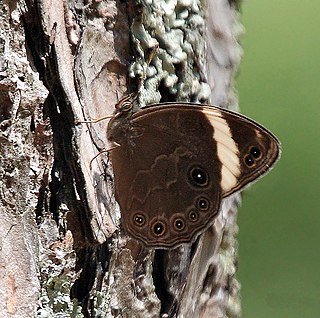
Lethe is a butterfly genus from the subfamily Satyrinae in the family Nymphalidae. The genus was erected by Jacob Hübner in 1819. It includes the treebrowns, woodbrowns, foresters and their relatives. The species in the genus Lethe occur in temperate-tropical southern and eastern Asia, up to Indonesia and in North America.

Kateretidae also known as short-winged flower beetles are a family of beetles in the superfamily Cucujoidea. There are 10 extant and 4 extinct genera, and at least 40 described species. They are found worldwide except in New Zealand. Adults are anthophagous, feeding on flowers, while the larvae are spermatophagous inside the flower corolla.
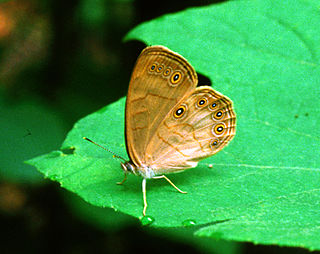
Satyrodes appalachia, the Appalachian brown or woods eyed brown is a species of Satyrinae butterfly that is native to North America.
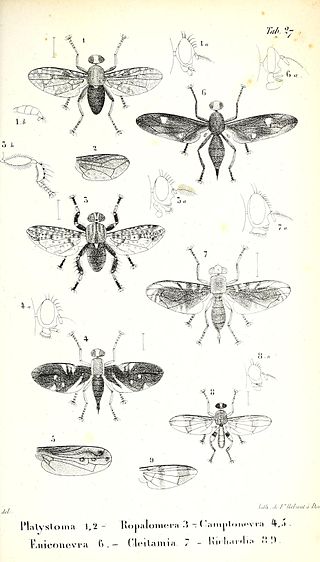
The Ropalomeridae are a family of acalyptrate flies.
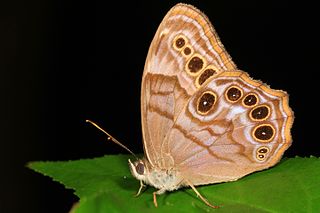
Lethe anthedon, the northern pearly-eye, is a species of butterfly of the subfamily Satyrinae in the family Nymphalidae. It is found in North America, from central Saskatchewan and eastern Nebraska east to Nova Scotia, south to central Alabama and Mississippi.

Lethe creola, the creole pearly-eye, is a species of brush-footed butterfly in the family Nymphalidae. It is found it the United States from North Carolina and central Georgia west to eastern Oklahoma and eastern Texas. Some authorities include this species in the genus Enodia as Enodia creola.
Syneta extorris is a species of leaf beetle. It is found in eastern North America.

Melanoplus sanguinipes, known generally as migratory grasshopper, is a species of spur-throated grasshopper in the family Acrididae. Other common names include the lesser migratory grasshopper and red-legged grasshopper. It is found in the Caribbean and North America.
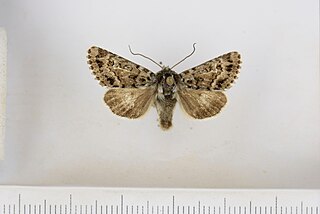
Polia richardsoni is a species of cutworm or dart moth in the family Noctuidae first described by John Curtis in 1834. It is found in North America.

Neonemobius palustris, known generally as the sphagnum ground cricket or marsh ground cricket, is a species of ground cricket in the family Gryllidae. It is found in eastern North America.

Attagenus schaefferi is a species of carpet beetle in the family Dermestidae. It is found in North America.
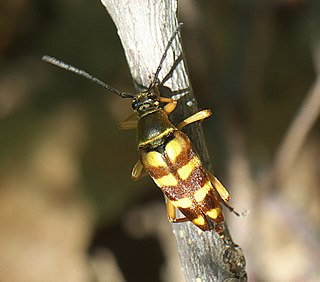
Typocerus velutinus, known generally as the banded longhorn or cerambycid beetle, is a species of flower longhorn in the family of beetles known as Cerambycidae. It is found in North America.
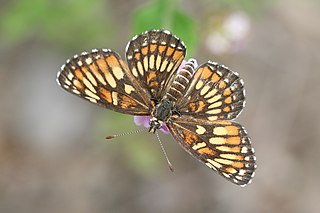
Chlosyne theona, the theona checkerspot, is a species checkerspots in the butterfly family Nymphalidae found in North America. The MONA or Hodges number for C. theona is 4508.
Buckellacris nuda, or Buckell's timberline grasshopper, is a species of spur-throated grasshopper in the family Acrididae. It is found in North America.

Historis odius, the orion cecropian, is a species of crescents, checkerspots, anglewings, etc. in the butterfly family Nymphalidae.
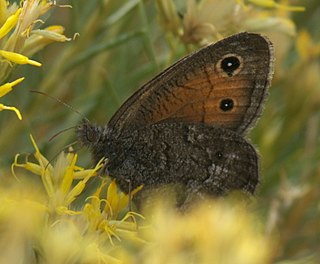
Cercyonis meadii, or Mead's wood nymph, is a species of brush-footed butterfly in the family Nymphalidae. It was first described by William Henry Edwards in 1872 and it is found in North America.

Melanoplus foedus, the striped sand grasshopper, is a species of spur-throated grasshopper in the family Acrididae. It is found in North America.

Tornos scolopacinaria, the dimorphic gray, is a species of geometrid moth in the family Geometridae. It is found in North America.
Aegialia conferta is a species of aphodiine dung beetle in the family Scarabaeidae. It is found in North America.
Neonympha helicta, the helicta satyr, is a species of brush-footed butterfly in the family Nymphalidae. It is found in North America. There is some question that this putative species is the same as that figured by Jacob Hübner as Oreas helicta

















